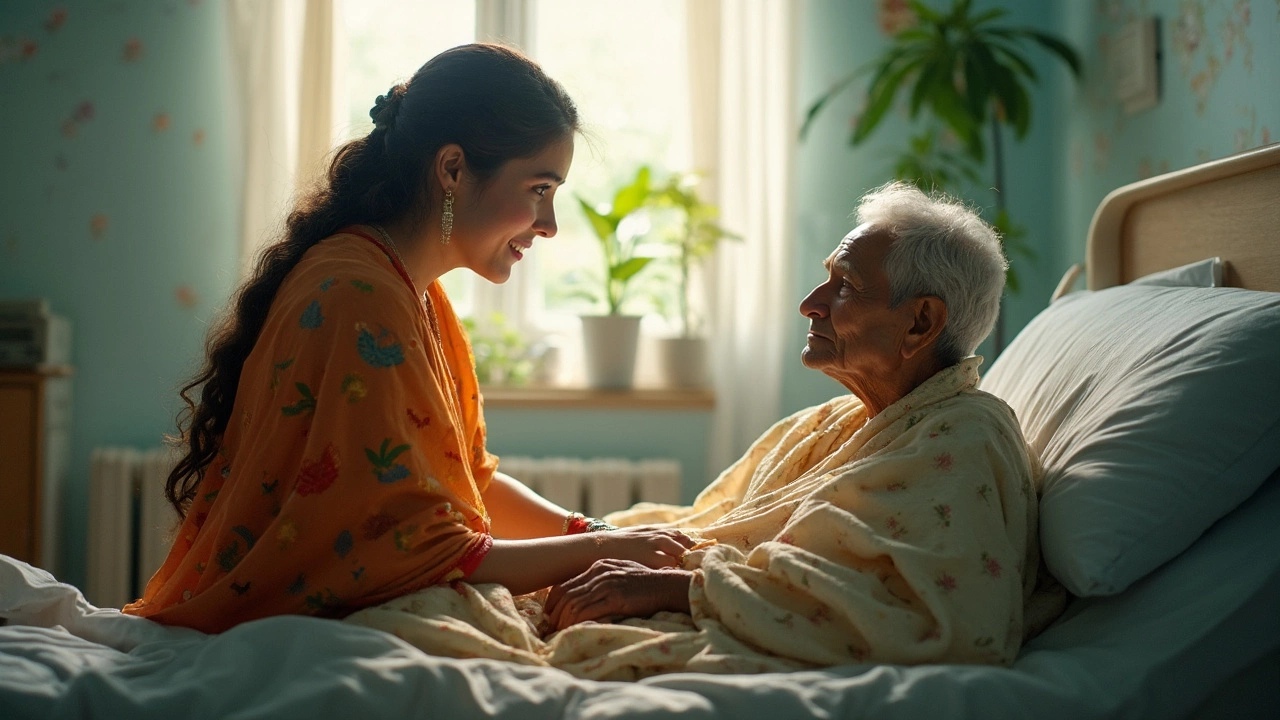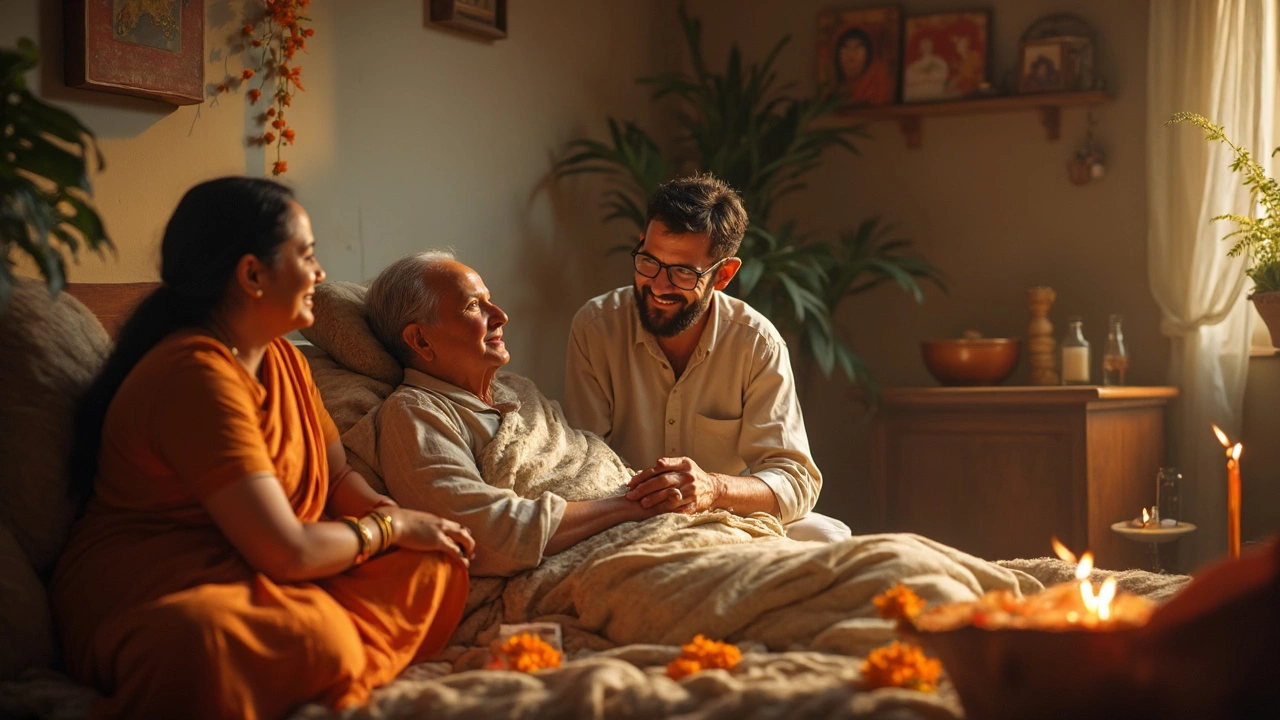Facing the final stages of cancer is daunting, and recognizing when the body is beginning to shut down is crucial for planning care and saying goodbyes. It's hard to think about, but being informed helps ease the journey.
The first thing most notice is overwhelming fatigue. It's beyond just being tired; it's a profound exhaustion that rests won't fix. You might see your loved one sleeping more hours, sometimes even throughout the day.
Another telltale sign is a significant change in appetite. This can look like barely eating or drinking, which naturally triggers worry, but it's part of the process. The body doesn't need as much energy as before, and forcing food might cause discomfort.
- Understanding End-Stage Cancer
- Signs of Body Shutting Down
- The Role of Fatigue
- Appetite and Digestion Changes
- Breathing Patterns and Sounds
- The Importance of Palliative Care
Understanding End-Stage Cancer
When we talk about end of life cancer, we're looking at the point where the disease has progressed to a stage where curative treatment is no longer an option. It's a tough reality, but understanding can help in better preparation and support for both patients and their families.
The symptoms you see don't just appear overnight; they evolve as the cancer symptoms become more apparent. Each type of cancer might have its own specific signs, but there are some commonalities when it reaches later stages.
The Journey Through End-Stage Cancer
One way to look at this stage is through the changes in a person's daily functioning. Mobility decreases significantly, not just because of weakness, but due to the energy that the disease demands from the body.
- Fatigue: It's one of the most common and debilitating effects, and it's relentless. Most individuals find it hard to perform any activity and spend more time resting.
- Pain Management: Pain is more intense and persistent, often requiring higher doses of medication to keep it bearable.
- Breathing Challenges: Breathing becomes less efficient, often resulting in labored or noisy breaths, sometimes referred to as a "death rattle."
Importance of Recognizing Symptoms
Recognizing these signs doesn't mean giving up hope; it means focusing on comfort and quality of life, often through palliative care. This involves managing symptoms and emotional support.
| Symptom | Commonality (%) |
|---|---|
| Fatigue | 85% |
| Pain | 70% |
| Breathing Issues | 60% |
Getting familiar with these signs aids in making better decisions regarding care arrangements, such as when it's time to consider home hospice, or more intensive medical facilities.
The key here is to have open conversations with healthcare providers about the expected course and what measures can alleviate discomfort during this time.
Signs of Body Shutting Down
Recognizing when a body is shutting down due to cancer involves noticing changes that indicate it's entering the final stages. These signs might develop gradually, and understanding them can help prepare loved ones for what's coming.
Profound Fatigue
Profound and constant fatigue is one of the earliest indicators that the body is shutting down. This isn’t just the usual tiredness after a long day; it's a deep exhaustion that keeps a person in bed for most of the day. At this stage, sleep becomes more precious as the body works less efficiently.
Loss of Appetite and Thirst
A marked decrease in hunger and thirst is quite common. While this might alarm family members, it’s a natural part of the process. The body starts to conserve its energy, and digestion isn't prioritized. It's important not to force food or drinks, as they might cause nausea or discomfort.
Altered Breathing Patterns
You'll likely notice changes in the way someone breathes as they reach the end stage of cancer. Breaths may become shallow or irregular. Sometimes, there might be long pauses between breaths, known as Cheyne-Stokes respiration. It can be unsettling, but it usually doesn’t cause discomfort to the person.
Decreased Urine Output
A decline in fluid intake corresponds with reduced urine output. It can also become darker, which is a sign the kidneys are functioning less. This is common and expected when the body is shutting down, so less frequent bathroom trips are normal.
| Common Sign | Description |
|---|---|
| Profound Fatigue | Extreme tiredness unrelieved by sleep |
| Reduced Appetite | Lack of interest in eating or drinking |
| Changing Breathing | Irregular or shallow breaths with pauses |
| Low Urine Output | Less urination, darker in color |
These signs are clear markers that the body is preparing for its final journey. Understanding them ensures that decisions about cancer treatment and care can be made smoothly, focusing on comfort and dignity.
The Role of Fatigue
Fatigue plays a significant role in the final stages of cancer. It's not just about feeling a bit tired; it's a deep, bone-weary exhaustion that regular naps can't cure. This fatigue occurs because the body is working hard, even if it's not moving much, trying to manage the weight of the illness.
Think of it like your cell phone battery that's gone through too many cycles; it depletes faster and charges slower, and this is how the energy levels might feel for someone nearing the end.
Why Does This Happen?
There are several reasons why fatigue hits so hard. For starters, the cancer itself uses up a lot of the body's energy. Add in treatments like chemotherapy and radiation, which often leave patients drained, and you've got a recipe for constant tiredness.
Also, as appetite decreases, nutrient intake drops, which means even less energy is available. The body may also be dealing with pain management, which can be both physically and mentally exhausting.
Managing Fatigue
Caring for someone dealing with cancer-related fatigue requires understanding and a lot of patience. Here are some tips to help manage it better:
- Create a calming environment for naps and rest. A quiet, comfortable space can make a big difference.
- Encourage short walks or gentle movements if they feel up to it, as a bit of physical activity can sometimes boost energy levels.
- Prioritize activities by energy level. Encourage them to focus on tasks that matter most during their most awake times.
- Nutrition still counts. Small, energy-boosting snacks throughout the day can help steady their stamina.
Understanding the role of fatigue in the context of end-of-life care is pivotal. It guides how we offer support, our expectations, and helps ensure that compassion is at the core of our care.

Appetite and Digestion Changes
When battling the advanced stages of cancer, appetite and digestion often undergo significant shifts. These aren't minor tweaks; they're profound changes that reflect the body's diminishing need for fuel as it shifts focus towards slowing down.
Loss of Appetite
A common sign of the body shutting down due to cancer is losing interest in food. It’s not just about skipping meals; individuals may reject food altogether. This often coincides with alterations in taste, which means familiar foods no longer appeal. Even favorite dishes might just not taste 'right.'
How the Body Adjusts
With the body's energy needs dropping, mechanisms kick in to prioritize comfort over digestion. The stomach might produce less acid, and digestive enzymes decrease, making eating more difficult and possibly painful. It's a strange thought, but these adjustments are part of the body's natural way of easing the process, conserving energy for important functions.
Supporting Loved Ones
- Offer small portions of easy-to-digest, nutrient-rich foods.
- Respect their cues and don't pressure them to eat.
- Keep hydration in mind, as sipping water or clear fluids can be crucial.
A gentle approach is key. It might help to remember that any small intake meeting the body's need at that moment is a victory.
Digestive Discomfort
Though appetite wanes, digestive discomfort like bloating or nausea might creep in. These can be due to reduced digestive activity. Some find relief with ginger tea or peppermint, simple remedies that can ease mild nausea.
Adjusting to these changes isn't just about the individual facing cancer; it's a journey for caregivers and family, too. Understanding what's happening helps everybody to navigate this stage more compassionately. Recognizing the body's signals enables better care, avoiding unnecessary interventions and focusing on comfort.
Breathing Patterns and Sounds
As the body approaches the final stages of life due to cancer, changes in breathing patterns are some of the most noticeable signs. This phase can be unsettling to witness but understanding what's happening might bring some comfort.
A common occurrence is something called 'Cheyne-Stokes breathing,' where a person experiences cycles of rapid breathing followed by periods of no breathing, or apneas. It's a natural process as the body begins to shut down, and though it might sound distressing, it usually doesn't cause discomfort for the person.
Beyond the pattern, you might notice other sounds. 'Death rattle' is a term used for the gurgling sound that emerges from the throat due to built-up fluids. This happens because the body's reflexes are slowing down and it can't clear these fluids effectively. While the sound can be concerning, it doesn't mean the person is in pain.
Tips for Family and Caregivers
- Try elevating the person's head to help ease breathing.
- Use a humidifier in the room to add moisture, potentially reducing discomfort.
- In some cases, suctioning might be considered by healthcare providers to remove excess fluids.
- Focused, calm breathing or playing reassuring music can create a peaceful environment.
Recognizing these breathing patterns and sounds ensures family members and caregivers are better prepared for the inevitable end-of-life stage, helping them focus on providing comfort rather than fear.
The Importance of Palliative Care
Palliative care is a powerful tool when dealing with the end of life cancer journey. It's not just for people who are about to pass away—it's about enhancing the quality of life, managing symptoms, and providing support for both patients and their families.
Support from a Skilled Team
One of the cornerstones of palliative care is the team-based approach. This includes doctors, nurses, social workers, and sometimes therapists or spiritual advisors. They all work collaboratively to address the physical, emotional, and spiritual needs of the patient. It's a holistic form of care that goes beyond just treating symptoms.
Managing Symptoms Effectively
Palliative care is amazing at symptom management. From fatigue to nausea, the team uses various medications and therapies to keep things under control. This helps patients live as comfortably and meaningfully as possible.
Helping Families Cope
For families, this form of care is vital. Understanding what's happening and why can really help in making tough decisions easier. The team offers counseling and practical advice, helping families navigate the emotional landscape that accompanies cancer treatment.
According to recent studies, about 70% of families who engaged in palliative care felt better prepared and more supported throughout the cancer progression. Here's a brief overview:
| Aspect | Percentage |
|---|---|
| Improved Quality of Life | 75% |
| Better Symptom Management | 70% |
| Increased Family Support | 80% |
So whether it's through medications, counseling, or emotional support, the role of palliative care is to ensure that patients and their families do not face this difficult time alone. It's about giving a sense of control and peace as the journey nears its end.



